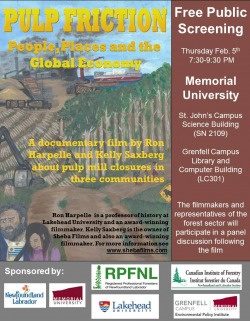Pulp Friction Film Screening

Lakehead historian Ron Harpelle and Independent Filmmaker Kelly Saxberg will be screening their new film, Pulp Friction, simultaneously on the St. John's and Grenfell campuses, Thursday Feb. 5th 7:30-9:30, Science Building (SN 2109), St. John's Campus, and Library and Computer Building (LC 301) at Grenfell Campus. A video linked panel discussion with the filmmakers and representatives of the Newfoundland forest sector will follow the (45 minute) film. Parking on the St. John's Campus will be available in lot 15B.
Pulp Friction is a documentary film about the shifting fortunes of pulp mill communities. In recent years, thousands of forestry sector jobs have been lost across Canada and the Northern Hemisphere. At the same time, forest companies have moved a significant portion of their industry to the Global South and new giant pulp mills are appearing on the horizon in these unlikely locations.The film looks at the lives of people living in the shadow of a pulp mill in three separate communities. It opens in Terrace Bay, Ontario, where the mill was spared from the wrecking ball by the Aditya Birla Group, an Indian multinational that will produce a pulp product that will be shipped abroad and used to make rayon fabric. Viewers are then taken to Kemijärvi, Finland where the world’s northern-most pulp mill recently closed. This community also depended on the mill to keep their town alive but were not as lucky as the residents of Terrace Bay. The mill is now closed, leaving the community to wonder what they will do. The film concludes in Fray Bentos, Uruguay. Unlike Canada and Finland, Uruguay is a country without natural forests. Today, one million hectares of eucalyptus plantations feed an enormous modern pulp mill that is changing everything. The future in this part of Uruguay is like the past in Terrace Bay and Kemijärvi, but at what cost? Pulp Friction tells the stories of these three communities and sheds light on globalization and how the lives of people in different parts of the world are bound together by this industry that knows no borders. Pulp Friction is in English, French, Finnish, and Spanish. This event is co-presented by the Departments of Geography, History and Biology at the St. John’s Campus and the Environmental Policy Institute at the Grenfell Campus. The event is sponsored by the Environmental Policy Institute, the Centre for Forest Science and Innovation, the Canadian Institute of Forestry (NL Section), the Registered Professional Foresters of Newfoundland and Labrador and Lakehead University.